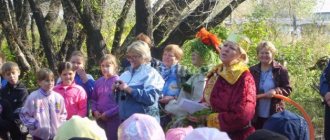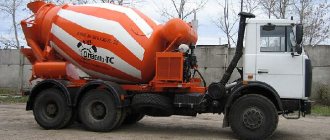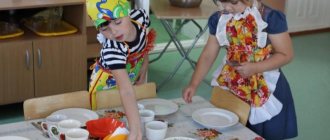Socially useful work. Production labor
The tasks of labor education and training are solved in labor lessons. In the elementary grades, children engage in paper cutting, clay and plasticine sculpting, plant care, wood, plastic and wire work, and school yard work. Work on the school experimental field and in workshops in high school, as well as in industrial and agricultural workshops in high school, develops students' general work skills and abilities, broadens their polytechnic prospects and contributes to the formation of their professional intentions and life plans.
Socially useful work. Such work has long been a good stimulus for the educational process, a real school of public service. Socially useful work, which is not only a source of material values, from the first days of school involves students in the sphere of public relations and introduces them to the affairs of the country.
The range of socially useful activities carried out by students is quite wide: from patronage of kindergartens and families of workers and war veterans to landscaping of villages and cities, creation of forest belts and parks, conservation of nature and historical monuments.
Participation in activities for the benefit of the district, city, and charity events is the best school of education.
School self-government occupies an important place in the labor education of students. He takes care of the cleanliness and beauty of classrooms, laboratories, workshops, school grounds, sports grounds and school grounds, as well as the repair of books and illustrative materials of the library. The simplest form of self-service is school service.
In the process of self-service, students develop collectivism, frugality, accuracy, and lay a strong foundation for sanitary and hygienic skills. They are the masters of the classroom and school, the organizers of common work, everyday life and leisure.
Production work. This is the sphere of pedagogical reality where the principle of combining education and productive labor is most fully and consistently implemented.
At different ages, the forms of organization of productive labor and the methods of its implementation are different. For younger schoolchildren, productive work is associated with play. In this case, tools and equipment specially made for children are used. Teenagers and high school students work alongside adults, use the same tools, the same equipment, work under the same conditions, receive their own work orders, plan the sequence of work, supervise its implementation and evaluate the results. Work will never be desirable and attractive for a child if it does not bring the experience of success and inner satisfaction.
Therefore, it makes pedagogical sense to organize work tasks in such a way that their implementation leads to tangible results, contributes to the development of dexterity, and enriches emotions. It also turned out that student labor training itself involves a significant conceptual base from many academic subjects. They cannot be taught in full in a comprehensive school. However, it is clear that schools cannot distance themselves from vocational education. The way out of this difficult situation is to introduce the subject “Technology”, which is taught in grades 1-9 and in grades 10-11 in specialized subjects.
“Technology” allows students to consistently form a conceptual understanding of work activity and its implementation in the form of exercises, laboratory-practical, school practical, creative and design work. Teachers of secondary schools, solving problems of labor education, should turn to the “Technology” course. Of course, educational excursions to enterprises of various profiles are useful for the professional orientation of students. It is possible that some of these profiles are underrepresented in the technology course.
However, it would be a mistake to think that effective work education does not need a solid conceptual basis. In secondary general education it is represented only by the subject “Technology”. Of course, it should be given due attention as much as other subjects, and when teaching any discipline it is useful to consider its interdisciplinary connections with technology.
Card index of conversations with children 5–7 years old “Let’s talk about hard work”
Nina Aleksandrovna Volkova
Card index of conversations with children 5–7 years old “Let’s talk about hard work”
Development of free communication between children and adults and children. "Let's talk about hard work."
Joint activities of the teacher with children 5-7 years old.
September
Conversation "Harvest".
Tasks. Continue to develop children's speech as a means of communication. Encourage children to try to express their point of view. Develop children's ability to observe ethical communication. Maintain children's interest in folk proverbs. To form a positive attitude of children towards work.
Talk.
“Children, let’s sit side by side and talk well, as from ancient times in Rus' they invited people to talk.” To a conversation when a person shares his thoughts. Children, why do you think they say this: “Good harvest and good harvesting?” (children's assumptions).
The teacher encourages the children.
- Don't be shy about your opinion! It is important for us to know what each of you thinks.
Kindly stops children who are trying to interrupt a friend's story.
- Please don’t interrupt, comrade. Respect your friend's opinion.
The teacher listens to the statements of all children. Summarizes what has been said.
- Children, in order to preserve a good, rich harvest, good, quick harvesting is needed. Good harvest and good cleaning.
Conversation “Like the master, so is the work.”
Tasks. Continue to develop children's speech as a means of communication. Encourage children to try to express their point of view. Develop children's ability to observe ethical communication. Maintain children's interest in folk proverbs. To instill in children a responsible attitude towards the assigned task.
Talk.
“Children, let’s sit side by side and talk well, as from ancient times in Rus' they invited people to talk.” To a conversation when a person shares his thoughts. Children, why do you think they say: “Like the master, so is the work?” (children's assumptions).
The teacher encourages the children.
- Don't be shy about your opinion! It is important for us to know what each of you thinks.
Kindly stops children who are trying to interrupt a friend's story.
- Please don’t interrupt, comrade. Respect your friend's opinion.
The teacher listens to the statements of all children. Summarizes what has been said.
- Children, the master is good, and the work is good. And a bad master does a bad job. Children, don’t forget to work, do your job well.
October
Conversation: “There is no good without work.”
Tasks. Continue to develop children's speech as a means of communication. Encourage children to try to express their point of view. Develop children's ability to observe ethical communication. Maintain children's interest in folk proverbs. To form a positive attitude of children towards work.
Talk.
“Children, let’s sit side by side and talk well, as from ancient times in Rus' they invited people to talk.” Why do you think the popular proverb says: “There is no good without labor?” (children's assumptions).
The teacher encourages the children.
- Don't be shy about your opinion! It is important for us to know what each of you thinks.
Kindly stops children who are trying to interrupt a friend's story.
- Please don’t interrupt, comrade. Respect your friend's opinion.
The teacher listens to the statements of all children. Summarizes what has been said.
- Children, there is no good without work. It’s not for nothing that people say that a good harvest and a good harvest, without labor there is no fruit; in order to be held in high esteem, you must love labor.
Conversation: “It’s a boring day until the evening.”
Tasks. Continue to develop children's speech as a means of communication. Encourage children to try to express their point of view. Develop children's ability to observe ethical communication. Maintain children's interest in folk proverbs. Cultivate hard work in children.
Talk.
“Children, let’s sit side by side and talk well, as from ancient times in Rus' they invited people to talk.” Children, why do you think people say: “The day until the evening is boring if there is nothing to do?” (children's assumptions).
The teacher encourages the children.
- Don't be shy about your opinion! It is important for us to know what each of you thinks.
Kindly stops children who are trying to interrupt a friend's story.
- Please don’t interrupt, comrade. Respect your friend's opinion.
The teacher listens to the statements of all children. Summarizes what has been said.
- Children, the day until the evening is boring if there is nothing to do. Those who love to work are not bored. Don't sit idly by, children, you won't get bored.
November
Conversation: “Skillful hands know no boredom.”
Tasks. Continue to develop children's speech as a means of communication. Encourage children to try to express their point of view. Develop children's ability to observe ethical communication. Maintain children's interest in folk proverbs. Cultivate hard work in children.
Talk.
“Children, let’s sit side by side and talk well, as from ancient times in Rus' they invited people to talk.” Why do you think the popular proverb says: “Skillful hands know no boredom?” (children's assumptions).
The teacher encourages the children.
- Don't be shy about your opinion! It is important for us to know what each of you thinks.
Kindly stops children who are trying to interrupt a friend's story.
- Please don’t interrupt, comrade. Respect your friend's opinion.
The teacher listens to the statements of all children. Summarizes what has been said.
- Children, skillful hands - hands that can do everything. Skillful hands do not know boredom. The day until the evening is boring if there is nothing to do. Don't sit idly by, children, you won't get bored.
Conversation: “Man’s labor feeds him.”
Tasks. Continue to develop children's speech as a means of communication. Encourage children to try to express their point of view. Develop children's ability to observe ethical communication. Maintain children's interest in folk proverbs. Cultivate hard work in children.
Talk.
“Children, let’s sit side by side and talk well, as from ancient times in Rus' they invited people to talk.” Why do you think the popular proverb says: “Work feeds a man, but laziness spoils him?” (children's assumptions).
The teacher encourages the children.
- Don't be shy about your opinion! It is important for us to know what each of you thinks.
Kindly stops children who are trying to interrupt a friend's story.
- Please don’t interrupt, comrade. Respect your friend's opinion.
The teacher listens to the statements of all children. Summarizes what has been said.
- Children, labor feeds a person, but laziness spoils him. Who does not work shall not eat. There is no good without work.
December
Conversation: “Business has time, but fun has time.”
Tasks. Continue to develop children's speech as a means of communication. Encourage children to try to express their point of view, agreement or disagreement with a friend’s answer. Develop children's ability to observe ethical communication. Encourage children to use proverbs in their speech. To instill in children a responsible attitude towards the assigned task.
Talk.
“Children, let’s sit side by side and talk well, as from ancient times in Rus' they invited people to talk.” Why do you think the popular proverb says: “There is time for work, but there is an hour for fun?” (children's assumptions).
The teacher encourages the children.
- And you, ... (child’s name,
what do you think! Agree or disagree with the opinions of your comrades.
Kindly stops children who are trying to interrupt a friend's story.
- Respect your comrade's judgment! Every person has the right to their opinion.
The teacher listens to the statements of all children, encouraging attempts to express their point of view, agreement or disagreement with a friend’s answer. Summarizes what has been said.
- Children, first do necessary, useful things, and then play.
Conversation "Who loves to work."
Tasks. Continue to develop children's speech as a means of communication. Encourage children to try to express their point of view, agreement or disagreement with a friend’s answer. Develop children's ability to observe ethical communication. Encourage children to use proverbs in their speech. Cultivate hard work in children.
Talk.
“Children, let’s sit next to each other and talk well.” Why do you think they say: “He who loves to work cannot sit idle?” (children's assumptions).
The teacher encourages the children.
- And you, ... (child’s name,
what do you think! Agree or disagree with the opinions of your comrades.
Kindly stops children who are trying to interrupt a friend's story.
- Respect your comrade's judgment! Every person has the right to their opinion.
The teacher listens to the statements of all children, encouraging attempts to express their point of view, agreement or disagreement with a friend’s answer. Summarizes what has been said.
- Children who love to work cannot sit idle. It’s not for nothing that people say that work for the hands is a holiday for the soul.
January
Conversation: “Without work, rest is not sweet.”
Tasks. Continue to develop children's speech as a means of communication. Encourage children to try to express their point of view, agreement or disagreement with a friend’s answer. Develop children's ability to observe ethical communication. Encourage children to use proverbs in their speech. To form a positive attitude of children towards work.
Talk.
“Children, let’s sit next to each other and talk well.” Why do you think the popular proverb says: “Without work, rest is not sweet?” ( children's assumptions).
The teacher encourages the children.
- And you, ... (child’s name)
, what do you think! Agree or disagree with the opinions of your comrades.
Kindly stops children who are trying to interrupt a friend's story.
- Respect your comrade's judgment! Every person has the right to their opinion.
The teacher listens to the statements of all children, encouraging attempts to express their point of view, agreement or disagreement with a friend’s answer. Summarizes what has been said.
- Children, without work, rest is not sweet. Work strengthens health and increases vitality. Work hard, children, don’t be lazy, and then enjoy your vacation.
February
Conversation: “We must love work.”
Tasks. Continue to develop children's speech as a means of communication. Encourage children to try to express their point of view, agreement or disagreement with a friend’s answer. Develop children's ability to observe ethical communication. Encourage children to use proverbs in their speech. Cultivate hard work in children.
Talk.
“Children, let’s sit next to each other and talk well.” Why do you think the popular proverb says: “To be respected, you must love your work?” (children's assumptions).
The teacher encourages the children.
- And you, ... (child’s name,
what do you think! Agree or disagree with the opinions of your comrades.
Kindly stops children who are trying to interrupt a friend's story.
- Respect your comrade's judgment! Every person has the right to their opinion.
The teacher listens to the statements of all children, encouraging attempts to express their point of view, agreement or disagreement with a friend’s answer. Summarizes what has been said.
- Children, honor is respect. To be respected, to be held in high esteem, children, you must love your work.
Conversation with the boys “The wealth of a young man is work.”
Tasks. Continue to develop children's speech as a means of communication. Encourage children to try to express their point of view, agreement or disagreement with a friend’s answer. Develop children's ability to observe ethical communication. Encourage children to use proverbs in their speech. To form a positive attitude of children towards work.
Talk.
“Children, let’s sit next to each other and talk well.” Why do you think people say: “The wealth of a young man is work?” ( children's assumptions).
The teacher encourages the children.
- And you, ... (child’s name)
, what do you think! Agree or disagree with the opinions of your comrades.
Kindly stops children who are trying to interrupt a friend's story.
- Respect your comrade's judgment! Every person has the right to their opinion.
The teacher listens to the statements of all children, encouraging attempts to express their point of view, agreement or disagreement with a friend’s answer. Summarizes what has been said.
- Children, if a fellow is hardworking and not lazy, everyone respects him and invites him to visit. A young man's wealth is labor. Hardworking fellow - well done!
March
Conversation with girls “Don’t learn by idleness, but learn by handicraft.”
Tasks. Continue to develop children's speech as a means of communication. To develop children’s ability to listen to another person and respect their opinion; calmly defend your opinion. Strengthen children's ability to observe communication ethics. Encourage children to use proverbs in their speech. Cultivate hard work in children.
Talk.
“Girls, let’s sit next to each other and talk well.” Why do you think they say: “Don’t learn by idleness, but learn by handicraft?” (children's assumptions).
The teacher encourages the children.
- And you, ... (child’s name)
, what do you think! It is important for us to know what each person thinks.
The teacher listens to the statements of all children, encourages children who carefully listen to the opinions of their comrades. Summarizes what has been said.
— A needlewoman, which means she knows how to do everything with her hands: sewing, knitting, embroidery. The girls, the needlewoman, not a slacker, were loved and praised by everyone.
Conversation: “Diligence and work lead to happiness.”
Tasks. Continue to develop children's speech as a means of communication. To develop children’s ability to listen to another person and respect their opinion; calmly defend your opinion. Strengthen children's ability to observe communication ethics. Encourage children to use proverbs in their speech. To form a positive attitude of children towards work.
Talk.
“Children, let’s sit next to each other and talk well.” Why do you think the popular proverb says: “Diligence and work lead to happiness?” (children's assumptions).
The teacher encourages the children.
- And you, ... (child’s name)
, what do you think! It is important for us to know what each person thinks.
The teacher listens to the statements of all children, encourages children who carefully listen to the opinions of their comrades. Summarizes what has been said.
- Children, effort and work lead to happiness. There is no good without work. Work for the hands is a holiday for the soul. From laziness - illness, from work - health.
April
Conversation "From laziness - illness."
Tasks. Continue to develop children's speech as a means of communication. To develop children’s ability to listen to another person and respect their opinion; calmly defend your opinion. Strengthen children's ability to observe communication ethics. Encourage children to use proverbs in their speech. Cultivate hard work in children.
Talk.
“Children, let’s sit next to each other and talk well.” Why do you think the popular proverb says: “Laziness brings illness, work brings health?” (children's assumptions).
The teacher encourages the children.
- And you, ... (child’s name,
what do you think! It is important for us to know what each person thinks.
The teacher listens to the statements of all children, encourages children who carefully listen to the opinions of their comrades. Summarizes what has been said.
- Children, from laziness - illness, from work - health. Laziness weakens us and causes illness. Work strengthens health and increases vitality. Work hard children, don't be lazy.
Conversation “A bird is recognized in flight.”
Tasks. Continue to develop children's speech as a means of communication. To develop children’s ability to listen to another person and respect their opinion; calmly defend your opinion. Strengthen children's ability to observe communication ethics. Encourage children to use proverbs in their speech. To form a positive attitude of children towards work.
Talk.
“Children, let’s sit next to each other and talk well.” Why do you think the popular proverb says: “A bird is recognized in its flight, but a man is recognized in his work?” (children's assumptions).
The teacher encourages the children.
- And you, ... (child’s name,
what do you think! It is important for us to know what each person thinks.
The teacher listens to the statements of all children, encourages children who carefully listen to the opinions of their comrades. Summarizes what has been said.
— Children, a person is valued by his hard work. A hardworking person is respected by everyone, but a lazy person is despised.
May
Conversation: “The harvest will not come on its own.”
Tasks. Continue to develop children's speech as a means of communication. To develop children’s ability to listen to another person and respect their opinion; calmly defend your opinion. Strengthen children's ability to observe communication ethics. Encourage children to use proverbs in their speech. Cultivate hard work in children.
Talk.
“Children, let’s sit next to each other and talk well.” Why do you think the popular proverb says: “The harvest will not come on its own: the crops need care?” (children's assumptions).
The teacher encourages the children.
- And you, ... (child’s name)
, what do you think! It is important for us to know what each person thinks.
The teacher listens to the statements of all children, encourages children who carefully listen to the opinions of their comrades. Summarizes what has been said.
- Children, the harvest will not come on its own: the crops need care. Don't put off until tomorrow what you can do today.
Conversation: “A small deed is better than a big idleness.”
Tasks. Continue to develop children's speech as a means of communication. To develop children’s ability to listen to another person and respect their opinion; calmly defend your opinion. Strengthen children's ability to observe communication ethics. Encourage children to use proverbs in their speech. To form a positive attitude of children towards work.
Talk.
“Children, let’s sit next to each other and talk well.” Why do you think the popular proverb says: “A little deed is better than a lot of idleness?” (children's assumptions).
The teacher encourages the children.
- And you, ... (child’s name)
, what do you think! It is important for us to know what each person thinks.
The teacher listens to the statements of all children, encourages children who carefully listen to the opinions of their comrades. Summarizes what has been said.
- Children, from laziness - illness, from work - health. Laziness weakens us and causes illness. Work strengthens health and increases vitality. Work hard, children, don't be idle.
June
Conversation “The sun paints the earth.”
Tasks. Continue to develop children's speech as a means of communication. To develop children’s ability to listen to another person and respect their opinion; calmly defend your opinion. Strengthen children's ability to observe communication ethics. Encourage children to use proverbs in their speech. To form a positive attitude of children towards work.
Talk.
“Children, let’s sit next to each other and talk well.” Why do you think the popular proverb says: “The sun paints the earth, but man’s labor?” (children's assumptions).
The teacher encourages the children.
- And you, ... (child’s name)
, what do you think! It is important for us to know what each person thinks.
The teacher listens to the statements of all children, encourages children who carefully listen to the opinions of their comrades. Summarizes what has been said.
— Children, a person is valued by his hard work. A hardworking person is respected by everyone, but a lazy person is despised.
July
Conversation “The bee is small, and it works”
.
Tasks. Continue to develop children's speech as a means of communication. To develop children’s ability to listen to another person and respect their opinion; calmly defend your opinion. Strengthen children's ability to observe communication ethics. Encourage children to use proverbs in their speech. To form a positive attitude of children towards work.
Talk.
“Children, let’s sit next to each other and talk well.” Why do you think the popular proverb says: “The bee is small, but it works?” (children's assumptions).
The teacher encourages the children.
- And you, ... (child’s name
, what do you think! It is important for us to know what each person thinks.
The teacher listens to the statements of all children, encourages children who carefully listen to the opinions of their comrades. Summarizes what has been said.
- Children, work hard, don’t be lazy. People honor and respect those who love work.
Conversation “Who reaps the harvest without loss.”
Tasks. Continue to develop children's speech as a means of communication. To develop children’s ability to listen to another person and respect their opinion; calmly defend your opinion. Strengthen children's ability to observe communication ethics. Encourage children to use proverbs in their speech. Cultivate hard work in children.
Talk.
“Children, let’s sit side by side and talk well, as from ancient times in Rus' they invited people to talk.” Why do you think the popular proverb says: “He who reaps the harvest without loss wins?” (children's assumptions).
The teacher encourages the children.
- And you, ... (child’s name)
, what do you think! It is important for us to know what each person thinks.
The teacher listens to the statements of all children, encourages children who carefully listen to the opinions of their comrades. Summarizes what has been said.
“Children, whoever harvests without loss wins and stores food for the winter.” Good harvest and good cleaning.
August
Conversation: “I missed the day, I lost the harvest.”
Tasks. Continue to develop children's speech as a means of communication. To develop children’s ability to listen to another person and respect their opinion; calmly defend your opinion. Strengthen children's ability to observe communication ethics. Encourage children to use proverbs in their speech. Cultivate hard work in children.
Talk.
“Children, let’s sit next to each other and talk well.” Why do you think the popular proverb says: “If you miss a day, you lose the harvest?” (children's assumptions).
The teacher encourages the children.
- And you, ... (child’s name,
what do you think! It is important for us to know what each person thinks.
The teacher listens to the statements of all children, encourages children who carefully listen to the opinions of their comrades. Summarizes what has been said.
“Children, if you miss a day, you lose the harvest; whoever harvests without loss wins.” Good harvest and good cleaning.
Conversation: “Without labor there is no fruit.”
Tasks. Continue to develop children's speech as a means of communication. To develop children’s ability to listen to another person and respect their opinion; calmly defend your opinion. Strengthen children's ability to observe communication ethics. Encourage children to use proverbs in their speech. To form a positive attitude of children towards work.
Talk.
“Children, let’s sit next to each other and talk well.” Why do you think people say: “Without labor there is no fruit?” (children's assumptions).
The teacher encourages the children.
“It’s important for us to know what each of you thinks.”
Kindly stops children who are trying to interrupt a friend's story.
- Respect your friend's opinion.
The teacher listens to the statements of all children, encouraging attempts to express their point of view, agreement or disagreement with a friend’s answer. Summarizes what has been said.
“Children, the harvest will not come on its own: the plants need care, if you missed a day, you will lose the harvest; whoever harvests the harvest without losses wins.” Without labor there is no fruit.
Games on labor education in preschool educational institutions for children of the middle and senior groups (4-6 years old)
As already mentioned, play activity in preschool age is the leading one. The information obtained during the conversation is reinforced through games. Games can be didactic (used in educational activities), or they can be role-playing. Each game aimed at the labor education of a preschooler must be appropriate for his age. The purpose of such games is to develop a positive attitude towards work.
In the middle group, children begin to become familiar with the concepts of “profession” and “work.” They learn how and why adults work. The list of professions for reference includes those that the child encounters in everyday life. This is a cook, a janitor, a nanny, a teacher, a musician, an artist, a painter, a driver, a salesman, a hairdresser. They must understand the essence of work (manager, stylist and others are not included in this list) . In the older group, children can play under the guidance of a teacher or independently. For independent role-playing games in groups, play areas are organized: hairdresser, shop, hospital, workshop, etc.
Labor education
Many researchers consider labor education as the core and highest level in the development of pedagogy. The Swiss educator J. G. Pestalozzi (1747-1826) said that children need to be prepared for life in society already at school. Otherwise they will fall into slavery. The last link in Pestalozzi's reasoning always has practical significance. He believed that the culmination of knowledge is practical life. If not, then the theory is lifeless, isolated from the demands of life. It is in this context that vocational education comes to the fore. Pestalozzi allowed the children in his “almshouse” (1769 - 1774) to work in the fields in the summer, and taught them weaving in the winter.
In the 1920s, Germany and Russia saw a strong surge of interest in labor education. Outstanding teachers, especially G. Kerschensteiner in Germany and P. P. Blonsky in Russia, developed labor school projects. Both believed that the school of knowledge does not stimulate student activity and does not take into account social conditions. Theory should not be divorced from practice, which is why its culmination is the work school. It must always be remembered that social progress is directly related to progress in the world of work.
Proponents of labor pedagogy make an assumption about activity theory, but they complement it by referring to the concept of labor. Unfortunately, the content is usually not explained. After conducting relevant research, we came to the conclusion that social work is only that activity that participates in the process of social exchange, that is, it is useful for other people, as a result of which it is rewarded or blamed. Work pedagogy mainly focuses on social work. Individual work as a purposeful effort, as a necessary condition for the development of students, is not denied, but the emphasis is on social (public) work. It is this emphasis that prevails in the teaching activities of II. P. Blonsky.
The concept of social work and methods of its evaluation are studied in economic sciences. Therefore, labor education is a type of economic, not political or legal education. According to Blonsky, a schoolchild acquires his first labor skills at school and family, then the range of his activities expands, he becomes a small farmer, a small artisan, a small citizen. The system of teaching schoolchildren is such that the work activity of adults is first studied and then reproduced. It is obvious that only those types of activities that are accessible to students with one form of disability or another are cultivated. Students are encouraged to take initiative and their interests are taken into account. Particular attention is paid to safety when performing work operations.
Particular attention is paid to safety when performing work operations to avoid damage to health.
The work of workers' schools revealed some of their shortcomings. Labor education enthusiasts clearly overestimated the ability of general secondary education to prepare students for future professions. The modern education system includes general secondary, secondary vocational and higher vocational education. In fact, supporters of workers' schools tried to combine secondary general and secondary vocational education in one educational institution. But there is no sufficient reserve of study time for this. The conceptual base taught in secondary schools is so vast that there is simply no time left for quality professional education. In addition, secondary specialized educational institutions, such as vocational schools and colleges, are selective in their training. If the activities of a secondary school are modeled on a specialized school, then the choice of higher professional education for graduates will be limited, and the school should provide the broadest possible prospects for future professional activity.
Role of the family
Raising a child and teaching him to work begins in the family. From an early age, when the baby is just beginning to socialize, he observes his parents, older brothers and sisters, and other relatives who are constantly nearby, and adopts their attitude to work.
Domestic chores do not always bring joy to the child; you have to overcome yourself. This builds character, develops willpower, and if parents do not skimp on praise, it also increases self-esteem.
Labor upbringing in the family is the most important stage in the formation of a personality, because this is where the child spends most of his daily life and is happy to first carry out light household chores for his mother, father or grandmother (cleaning up toys), and then get accustomed to more serious work (washing dishes, taking out the trash). ).
If parents instill in their child a love of work from childhood, allowing him to take part in matters that interest him (even if he only gets in the way at first), then as he grows up, they will receive a full-fledged assistant in the household. And, on the contrary, by forbidding the child to help his mother or father, one should not be surprised that he then categorically refuses to work for the benefit of the family, and then society.
There is no need to push your child away if he wants to help bake a cake or repair a car. You can let him do simple work that he can do and explain how to do everything correctly. This is how the child gets accustomed to work and at the same time his self-confidence increases, because he is doing “adult work.”
Teaching schoolchildren to work
The love of work begins to be instilled most actively at school. Younger students collect herbariums, help in the garden and in the living corner (if there is one), and water the flowers in the classroom.
Thanks to labor education, the child masters skills that he will then need throughout his life (household, self-service).
Work develops independence from adults, increases self-esteem and the desire to develop further.
By doing even the simplest work independently, the baby learns to do everything neatly and beautifully, which develops a sense of beauty. He begins to appreciate other people's work, feeling that to achieve a result it is necessary to make volitional efforts.
Labor education of schoolchildren in high school is associated with career guidance of students.
For this purpose, lectures are held in which high school students are presented with representatives of different professions:
- talk about their work;
- explain where you need to go to study in order to get a profession;
- answer children's questions.
They organize excursions to enterprises where people’s work is clearly shown. Basically, children are taken to a city-forming enterprise that needs fresh personnel. As a result, schoolchildren learn first-hand about various types of work activities, which allows them to make an informed choice of profession.
Labor is the basis for the harmonious development of personality. It is important from early childhood to instill in a child respect for him, to work productively, increasing his professionalism. This is precisely the main goal of labor education.







